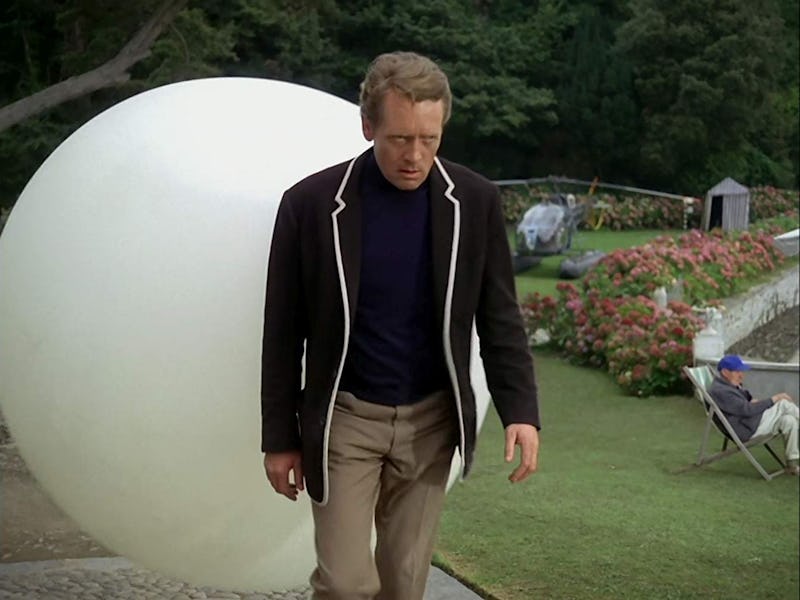Wandavision's secret predecessor is a mind-bending '60s sci-fi gem
If you like the suburban prison of WandaVision, you're gonna love The Prisoner.

Can an entire show be built on the premise of WTF? The people behind WandaVision are hoping the answer to that question is a big yes, and that viewers will continue to watch every episode of the show until it all somehow comes together.
Unlike most big Marvel Studios products, WandaVision isn't upfront about its setting, premise, or even the stakes. Comparing the show to a season-long version of a Black Mirror episode isn't wrong, but even "San Junipero" explained what the hell was going on much sooner.
Perhaps the best example of a show that has a similar effect is the 1967 series The Prisoner. If you love the kitschy creepiness of WandaVision, you're going to love The Prisoner. Here's why.
👉 Follow all of Inverse's WandaVision coverage at our WandaVision hub.
The best way to describe The Prisoner to someone who has never seen it is to maybe say this: Imagine a B-list secret agent trapped in a storybook town, where he's stalked by a giant bouncing white sphere. Everyone appears to be a prisoner, but nobody knows why. When Wanda found the helicopter toy in Episode 2 of WandaVision, it immediately reminded me of the climax of the first episode of The Prisoner when trying to fly a helicopter doesn't end up so well.
Right from the start, the titular character of The Prisoner — Number Six (Patrick McGoohan) — is kidnapped and taken to a seaside village that is meant to be a recreation of his hometown. No one in the town explains exactly what they're doing there, and on the surface, they all appear to be living in some kind of high-security insane asylum. Only here, the modes of control are far more elaborate than fences or locked doors. When Number Six tries to leave the town in a helicopter at the end of the episode, we see that those in control of the village have the ability to bring him right back down to Earth with a flip of a switch.
Is any of this real?
Does the Village exist only in the mind of Number Six? Well, in a Truman Show-style move, we're actually shown who is operating the Village in the very first episode. We aren't, however, told why they are doing what they're doing. This would be like if WandaVision had shown us that person at the TV control station in the middle of the episode. The Prisoner is great because even when it reveals the so-called-man-behind-the-curtain, it only raises more questions.
Because this show was filmed on a shoestring budget in 1967, there's a melodramatic aspect to it all that brings to mind the not-so-great Sean Connery-era Bond films. In fact, one popular fan theory is that prior to the series beginning, Number Six was a James Bond-type agent, and the Village is his surreal forced retirement. Metafictionally, this notion exists because the show 100 percent makes us think that Number Six was some kind of a government agent. At the time, the audience believed that because a very famous show that Patrick McGoohan had starred in previously was called Danger Man — a show about a James Bond-ish secret agent.
If you substitute "former secret agent" with "former Avenger" you can already start to see why WandaVision has so much in common with The Prisoner. In WandaVision, we hear a voice say, "Wanda, who's doing this to you!?" If you love Marvel, you can come up with a list of in-universe answers. Maybe it's Hydra. Maybe it's the agency called SWORD. In any case, the world-building in WandaVision, on some level, occurred before the show got started.
The Prisoner is like that, but without any kind of outside mythology to draw upon. It's as if WandaVision actually wasn't a Marvel show, and the character played by Elizabeth Olsen wasn't literally meant to be Wanda Maximoff, only to remind you of her. That's what Patrick McGoohan was doing with The Prisoner; using his status as secret agent "John Drake," (from Danger Man) to create a show about a faux-John Drake trapped in a surrealistic village of lies and secrets.
Is this the 2021 version of The Prisoner? Maybe!
Explaining what The Prisoner is all about would be a crime. It's also not exactly possible. The show only ran for one season, so it's not like everything was totally wrapped up. But it's excellent nonetheless. In fact, The Prisoner is an early example of science fiction TV not giving the audience everything it wanted right away. It was an intentionally elusive show, which closely guarded its secret premise.
If WandaVision doesn't answer everyone's questions satisfactorily, it's possible that's been the point all along. In The Prisoner, the mood and the concept were enough to keep you watching, and perhaps if we applied that same kind of thinking to WandaVision, the show could become more than just a collection of Marvel Easter eggs and clues. If viewed through the lens of The Prisoner, maybe WandaVision isn't supposed to make sense, and maybe it never will. But that doesn't mean it doesn't have something to say.
The Prisoner is streaming now on Amazon Prime.
This article was originally published on